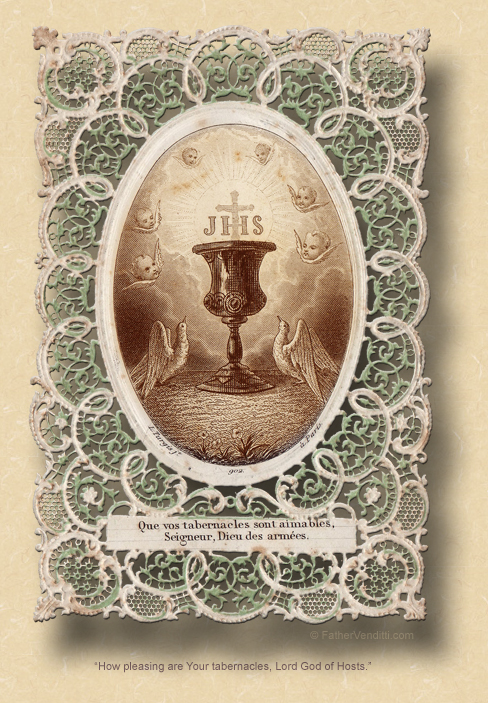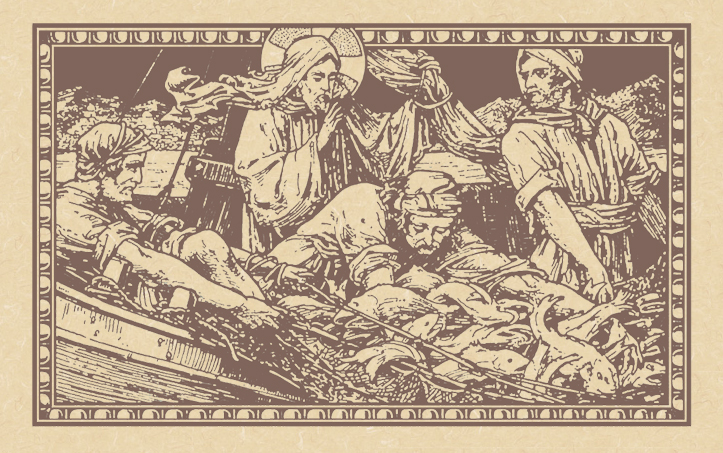A Day Without Sunshine is Like … Night.
Easter Friday.
Lessons from the octave, according to the ordinary form of the Roman Rite:
• Acts 4: 1-12.
• Psalm 118: 1-2, 4, 22-27.
• [Sequence (optional)] Victimæ paschali laudes…*
• John 21: 1-14.
Lessons from the octave, according to the extraordinary form of the Roman Rite:
• I Peter 3: 18-22.
• Psalm 117: 24, 26, 27.
• [Sequence] Victimæ paschali laudes…*
• Matthew 28: 16-20.
Bright Friday.
Lessons from the pentecostarion, according to the Ruthenian recension of the Byzantine Rite:
• Acts 3: 1-8.**
• John 2: 12-22.
FatherVenditti.com
|
 7:49 AM 4/21/2017 — The Scripture lessons of the last two days presented to us two episodes from the life of our Lord from Luke not found in any of the other Gospels: first, our risen Lord's encounter with the disciples on the road to Emmaus, at the end of which He offers Holy Mass for them then promptly vanishes since the presence of the Blessed Sacrament makes His human manifestation superfluous; the other, His first meeting with His own Apostles in Jerusalem. Today's episode is another one found only in one Gospel, and this time it's from John. It is, in fact, the very event I made reference to last Sunday, for those that were here. 7:49 AM 4/21/2017 — The Scripture lessons of the last two days presented to us two episodes from the life of our Lord from Luke not found in any of the other Gospels: first, our risen Lord's encounter with the disciples on the road to Emmaus, at the end of which He offers Holy Mass for them then promptly vanishes since the presence of the Blessed Sacrament makes His human manifestation superfluous; the other, His first meeting with His own Apostles in Jerusalem. Today's episode is another one found only in one Gospel, and this time it's from John. It is, in fact, the very event I made reference to last Sunday, for those that were here.
Now, we mentioned yesterday that the reason the Apostles could recognize Jesus when He appeared to them, while the disciples on the road to Emmaus could not, was because the Apostles were priests and thus enjoyed a special relationship with our Lord, which was also the reason that our Lord offers Holy Mass in Emmaus and not in Jerusalem, since this was something the Apostles could now do for themselves. But we also mentioned that being priests didn't make them any holier, nor did it make them smarter than anyone else; and, their behavior in this little scene is presented by the Evangelist as a warning that pertains directly to our own journey in the interior life.
The reason they don't recognize our Lord on this occasion in spite of being priests is simple enough: they are gathered together on the beach at night, and Saint John tells us that they are approached by our Lord just as day is breaking; so, it's dark out, and they're just not seeing Him clearly. Nothing more than that. But remember, we're dealing here with Saint John. Nothing in John's Gospel is without meaning; even the most minute details speak something of importance. His Gospel begins, remember, with an interplay between light and darkness; man is born into darkness and Jesus is the Light which has come into the world. So, what time is it when this scene opens? It's night. And where exactly is this beach where they're having this all-night clam bake? It's by the Sea of Tiberias. This isn't Saint John just giving us a reference point on a map. We've been on this beach before. Look at who John says was there: Peter, Thomas, Nathaniel, and the sons of Zebedee, James and himself. This is the very beach where He met all these people for the first time three years before. This was the very beach where He commandeered Peter's boat to preach to the crowds on the shore, performed the miraculous catch of fish, and told Peter he would become a fisher of men, after which he and his two partners, James and John, went off with Him, leaving poor old Zebedee to clean the nets by himself (cf. Luke 5: 1-11). And here they are, back on this very same beach, in the middle of the night, doing what? The same stupid thing they were doing before: trying to catch fish in the middle of the night. “Master, we have worked hard all night,” Simon said to Jesus at their first meeting, “and have caught nothing…” (Luke 5: 5).
And here they are, all over again. Even after having spent three years with our Lord, even after suffering through the Passion with Him, even after witnessing His death and rejoicing in His resurrection, they're back on this very same beach, relapsing into their old ways. And is that not so often the story of our own spiritual journey?  We have our moments of enlightenment, in which we are filled with love for our Lord and fervor for our faith, when we are so on fire with apostolic zeal that we want to go out and convert the world; then the next thing we know we're back right where we started, lethargic in our efforts, tepid in our faith, almost as if it never happened. We come out of confession firmly resolved to change and turn over a new leaf, then find ourselves back again with the same old sins. It's our fallen nature. In the case of the Apostles, even the Holy Priesthood didn't make them immune to it. We have our moments of enlightenment, in which we are filled with love for our Lord and fervor for our faith, when we are so on fire with apostolic zeal that we want to go out and convert the world; then the next thing we know we're back right where we started, lethargic in our efforts, tepid in our faith, almost as if it never happened. We come out of confession firmly resolved to change and turn over a new leaf, then find ourselves back again with the same old sins. It's our fallen nature. In the case of the Apostles, even the Holy Priesthood didn't make them immune to it.
But rather than become discouraged at this, we should notice how our Blessed Lord responds. What does He do when He finds His apostles in this dejected state on the beach where they first met, just as the sun is rising in the east? The very same thing He did three years before: He repeats the miraculous catch of fish. The message couldn't be clearer: it doesn't matter how many times we fall, or how far; it doesn't matter that we confess the same sins all the time; it doesn't matter if we have these alternating periods of zeal and apathy. Jesus will perform the miraculous catch of fish as often as we need it.
On both occasions—when they first met Him and in this episode where they meet Him for the third time after His resurrection—as long as they labored at night, apart from our Lord, they labored in vain. In the absence of Christ, every day is an empty night, and everything we do is useless; but, when we labor side by side with our Blessed Lord, night becomes day, and everything we do bears fruit, because everything we do is really done by Christ working through us.
Did you ever stop to consider why so many of our Lord's apostles were fishermen, why our Lord was so particularly attracted to men who made their living on the sea? I think it might be because, to be a commercial fisherman, you have to have patience.*** Long hours of waiting throughout the night, casting your nets again and again and again, sometimes catching something and sometimes not. There's never a guarantee of success, but there is certainly a guarantee of failure if you give in to discouragement and stop casting your net. And so it is for each one of us.

* "Christians! to the Paschal Victim offer your thankful praises. The Lamb the sheep redeemeth: Christ, Who only is sinless, reconcileth sinners to the Father. Death and life contended in that conflict stupendous: the Prince of Life, Who died, deathless reigneth. Speak, Mary, declaring what Thou sawest wayfaring: 'The tomb of Christ Who now liveth: and likewise the glory of the Risen. Bright Angels attesting, the shroud and napkin resting. Yea, Christ my Hope is arisen: to Galilee He goeth before you.' We know that Christ is risen, henceforth ever living: Have mercy, Victor King, pardon giving. Amen. Alleluia."
** In the Byzantine-Ruthenian Rite, Bright Friday commemorates the Holy Apostles Peter & John, whose cure of a crippled begger forms today's Apostolic lesson from Acts; this same lesson was read in the ordinary from of the Roman Rite on Easter Wednesday. It is not read in the extraordinary form during the Octave, but the sermon by Peter following his subsequent arrest is read throughout the Octave, as it is a doctrinal exposition of the resurrection.
*** Cf. Msgr. Ronald A. Knox, Sermon on the Feast of Ss. Peter & Paul, June 29, 1947.
|

